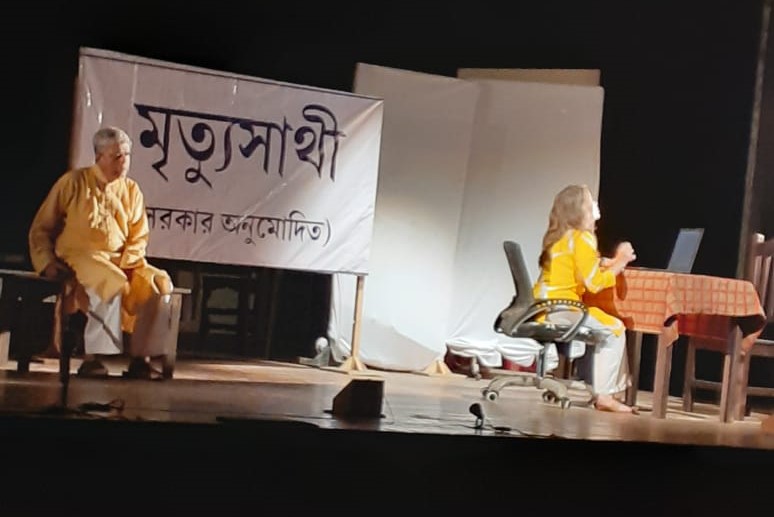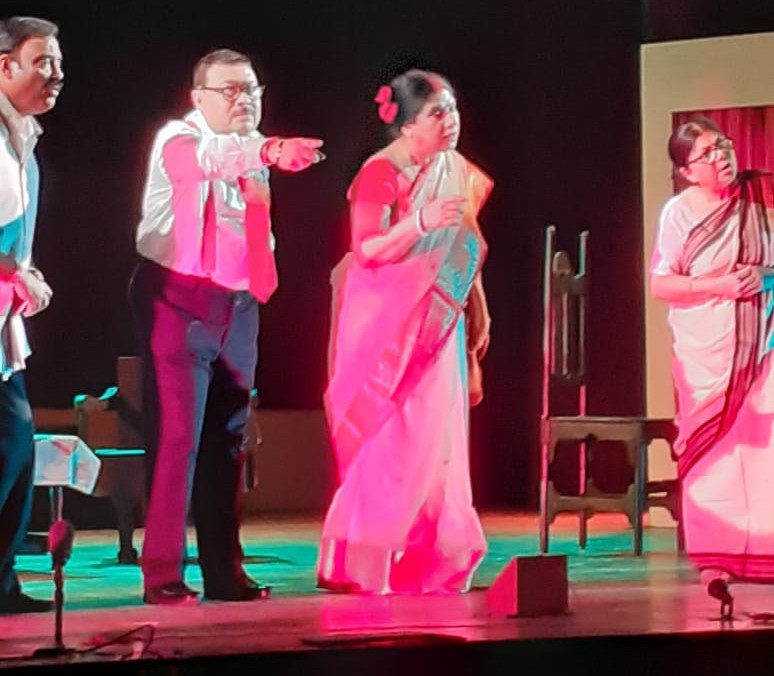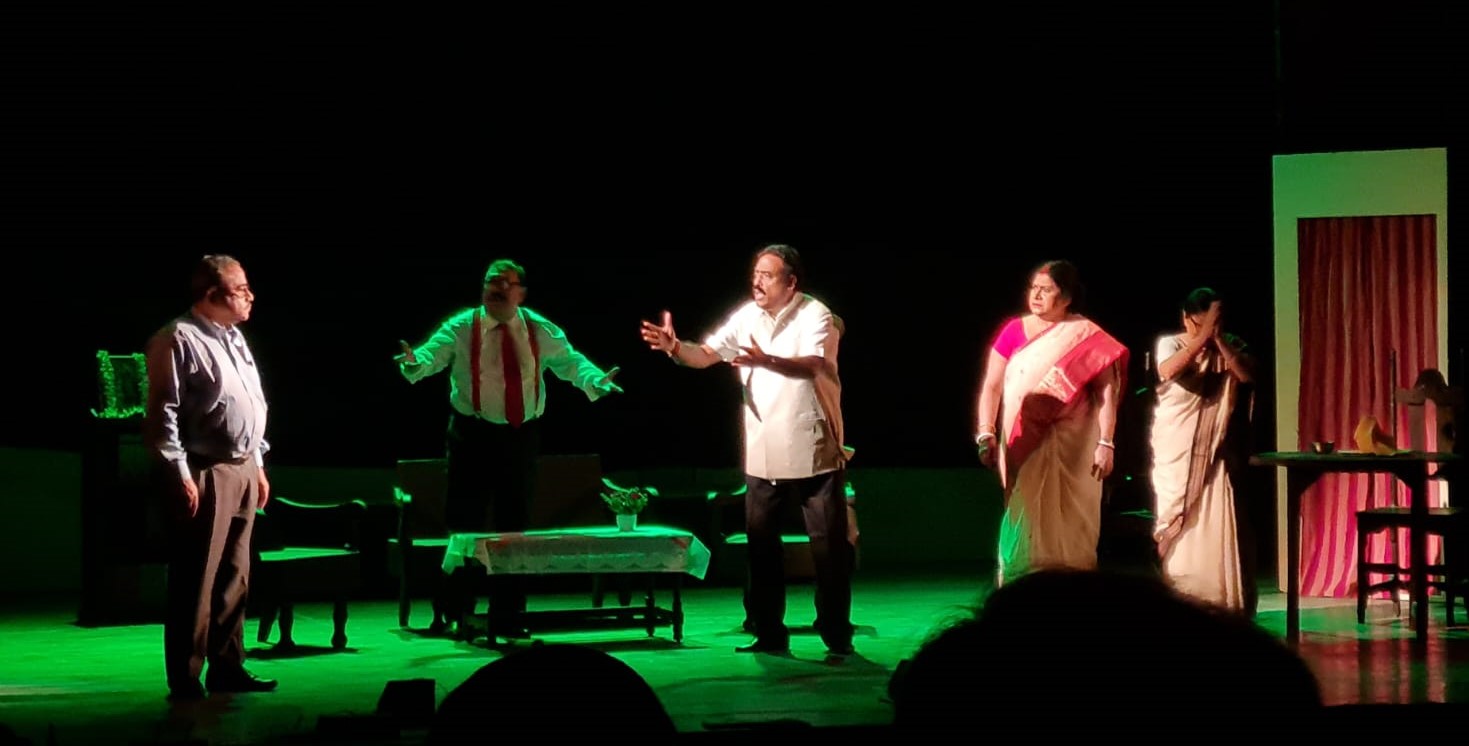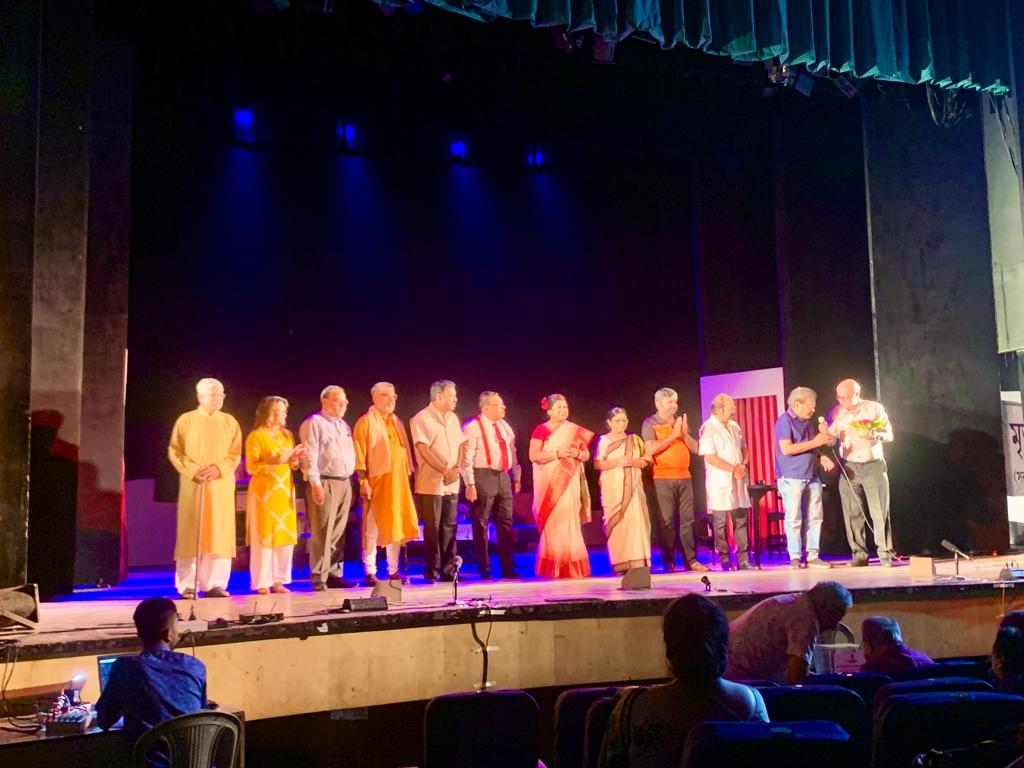Locked in animated suspension. Cramped up within the four walls of a boxy lift. And that state provided occasion for the lead actor to reflect on his career, its growth stalled midway, symbolized by the stoppage of the eponymous contraption halfway, and with the associated ramifications. Such was the content of the drama – presented by DKS – that he elected to convey to his audience, relying more on stridency than on inflection, on histrionics than on acting. The occasion: the four-day drama festival, Sampreeti, of eight clubs of Kolkata, exhumed after a hiatus of three COVID-racked years. At Uttam Mancha, tucked away in a by-lane of south Kolkata. On day 3, Thursday, the 16th of March 2023.
A patty-and-tea break later commenced the presentation of Dalhousie Institute. The title, MRITYU SHATHI (MS) -- death aide, to summon a calque -- triggered misgivings that that it would be a black comedy. As it transpired, the play, scripted by Rajat Ghosh, was a comedy of manners. Madhab Sen, the protagonist, yearned for death to escape from the implacable truculence of his wife, Anita, whom he called buno mosh, a wild buffalo. A more unflattering appellation, even a congenital misogynist will agree, is difficult to come by. Chuckles that peppered the length of the play turned into belly laugh.

What rankled was her taunt for his failure in committing suicide by jumping into the river, and – to pour insult upon injury -- ending up paying the beat constable a consideration of Rs 200 for the aborted attempt, the cop responding to Madhab’s naïve infelicity for a receipt with a few whacks of the baton on the hapless man’s rump.
Exasperated, Madhab approached Mrityu Shathi, a quango that specialized in dispatching willing aspirants to Hades. To his utter dismay, he found he was pitted against the bane of all such organisations, --inextricably entwined with a tape that has attained notoriety for its colour, the vividness matched only by the trouser-braces of the crafty Mr Dutta -- frustrating Madhab’s quest for quietus. From the production of his photograph and Aadhar card, to the furnishing of a full-fledged biodata, to undergoing a medical check-up -- no less, a medical check-up for a suicide! This last was necessitated, as elucidated at length by Badal, the MS executive, to preclude any disease, which constituted God’s implement for summoning mortals, and hence an exclusive territory of the Almighty, and hence again not to be intruded upon for facilitating felo de se.

Be that as it may, a day was finally decided upon for Madhab’s final journey, his assisted death, as it were, to the immense felicity of his disgruntled wife, who could not wait to be liberated from this good-for-nothing wretch and be set loose among the handsome toyboys she so desperately wanted to court. And, at once, attain financial freedom by acquiring her husband’s job. This last was put paid to by Mr. Dutta, Madhab’s boss, who had a stake in the suicide as well, -- bidding Madhab farewell with a bouquet of roses -- keen as he was to fill up the ensuing vacancy with his nephew.
All projections came to naught when Badal pronounced Madhab unqualified for the much-sought-after final journey, afflicted as he was, as the clinical examination diagnosed, with piles! Madhab’s vehement denials of haemorrhoids gracing his nether regions were scotched by Anita who averred he suffered from chronic constipation.

Were the references to red-tapism, Sabuj Sathi, the son’s opting for politics as the surest and fastest way to big money, never mind if tainted, and the nepotism depicted in the closing tableau, allusions to the prevalent state of affairs?

Paramita Roy portrayed the demonic wife appropriately; Dr Samaresh Gooptu and veteran Tapasi Mukherjee redeemed their roles as the MS executive and jethima with their under-acting. The remaining cast: receptionist – Lorraine White, who impressed with her accent less Bengali; boss, Mr Dutta – Sanjoy Mukherjee; Dr Samanta -- Saibal Sen; politician – Raja Mukhopadhyay; old man – Raju Raman; policeman and politician’s lackey – Amit Karmakar. The success of the play could, in large part, be attributed to the hard work of the technical director, Sukumar Mukherjee, who also did the voice-over on phone, and the direction of thespian Biplab Dasgupta. Jayajit Biswas left the audience wishing for a couple of reprises. Ain’t that possible, Mr President, sometime later at the club?
Written by Amit Dutt & coordinated by Amit Ukil